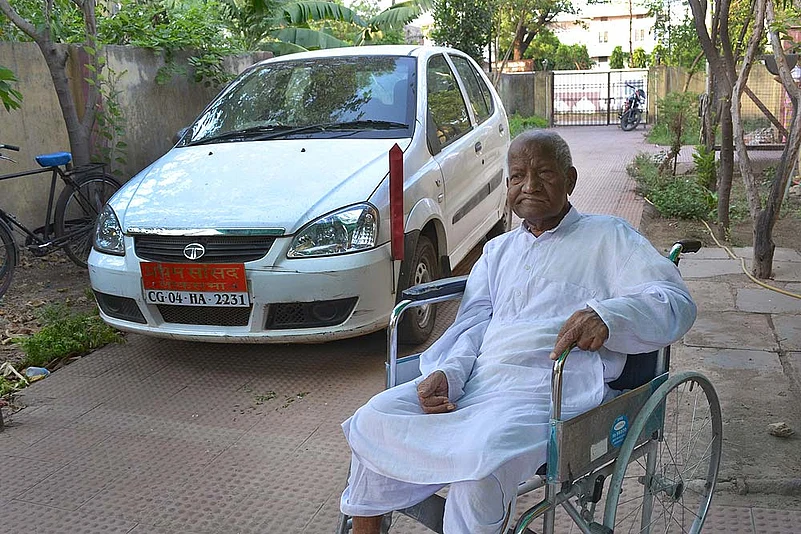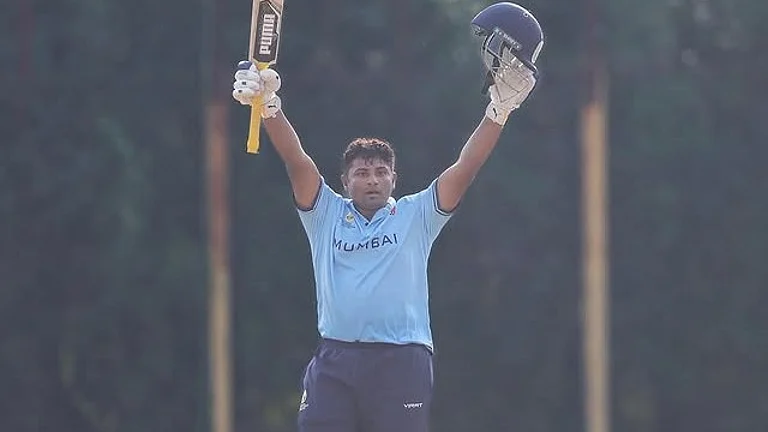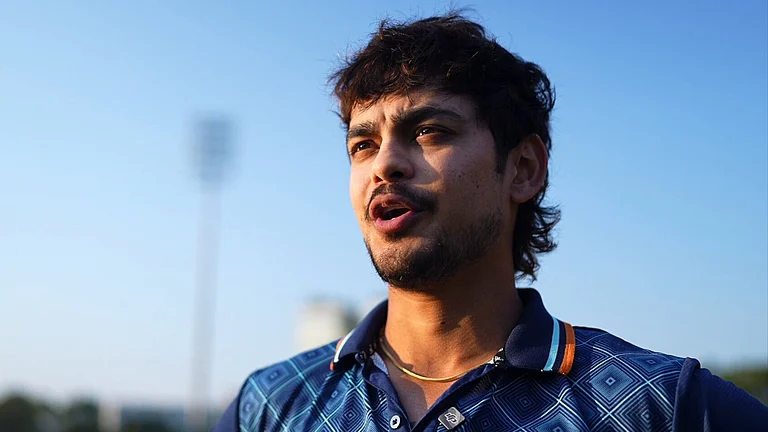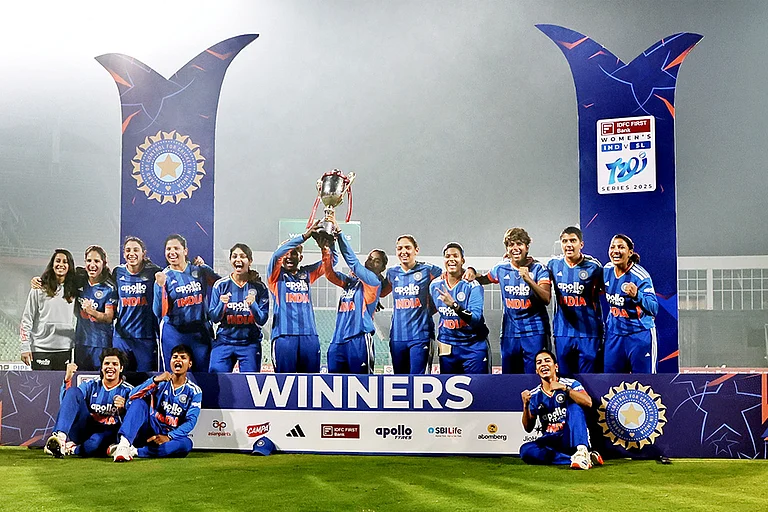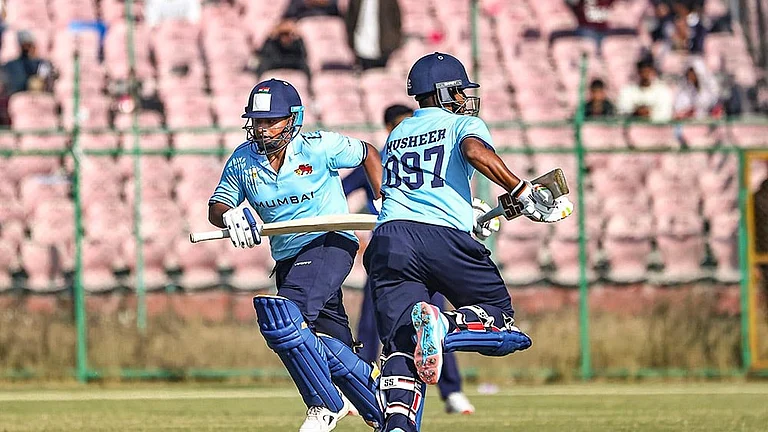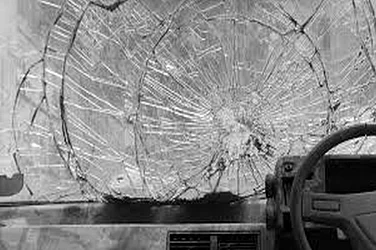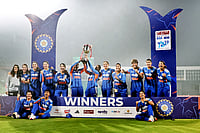
- Reshamlal Jangde, above, second from right, with the first president, Dr Rajendra Prasad, at an MPs’ felicitation meeting
- Kaneti Mohan Rao was surviving on a Rs 1,400 pension, not even aware that ex-MP’s pensions had been revised in ’09
- All the old-timers are quite disappointed with today’s lot of MPs. Thay say there’s
no sense of integrity or decorum.
***
It would have been another lost chapter wedged in the fading yellow pages of history. Reshamlal Jangde is 90 now, one of only four surviving members of the first Lok Sabha of independent India in 1952. In 1949, impressed by his zeal, Prime Minister Jawaharlal Nehru had reserved a berth for him in the first Parliament, with fiery revolutionary leaders like Pandit Sunderlal Sharma, Thakur Pyarelal Singh, Barrister Chhedilal and Khoobchand Baghel rallying behind him. Meeting you at the government quarters in Raipur, Jangde says he could just as well have passed his last years amid the swirl of extended family and admirers in Chhattisgarh had it not been for a rendezvous with Lok Sabha Speaker Meira Kumar in January 2012. Which was when a bit of history unravelled itself.
It goes all the way back to the village of Parsadih in today’s Chhattisgarh, where Jangde was born to a poor Dalit family of farmers in 1925. The story goes that a determined Jangde used to resolutely swim across the Mahanadi everyday so that he could attend school on the other side. With RSS shakhas spawning all over, he eventually swam into politics and chartered a volatile career. “Back in those days, ideological differences were respected, but now too much vulgarity has seeped into politics,” he laments. From 1939 to 1942, inspired by the doctrinaire teachings of Madhav Sadashiv Golwalkar and Eknath Ranade, Jangde joined the RSS ranks and soon landed in jail for his incendiary speeches.
Though his leanings were with the Hindutva organisation, Jangde was a social activist at heart. Soon he was influenced by Gandhi’s ideals and joined the Quit India Movement, thus becoming a pivot in the Dalit community and among other backward castes.

Rishang Keishing, 94 India’s oldest parliamentarian and CM of Manipur four times, he’s told the Congress that he’s hanging up his boots. (Photograph by Bullu Raj)
Which is how Jangde caught Nehru’s eye. By then, he was already a law graduate from Nagpur, the first from his Satnami Samaj and had a roaring practice going. A Scheduled Caste, he contested from a general seat to make it to the first Lok Sabha in 1952 from Bilaspur as a Congressman. Later, in the ’70s, a swing happened again during the Emergency when, inspired by the JP Movement, he joined the Janata Party and thereafter slowly drifted towards the BJP. His last stint in Parliament was from 1989-91 as a member of the BJP, a party he says he still belongs to. After that, Jangde never got a ticket, but the seasoned politician has taken it in his stride. “Back in our days, we would campaign on bullock carts, but now muscle and money power dominate the political scene. Look at the number of politicians using helicopters these days!” he says in dismay. That said, he hasn’t lost any of his fire and energy. “I could still go on the campaign trail, no problem...the Independence struggle hardened us much more, unlike the current crop of politicians.” Jangde has been closely watching the electoral scene. “I think we should repose faith in Modi this time,” he says.
Jangde’s family, though, isn’t happy with its lot. “We are poor and haven’t been given any special privileges by the government. A freedom fighter, politician and a man of integrity has been ignored,” rues son Hemchand Jangde. They say Jangde Sr never made much money during his political career, and now the parties have forgotten him. The state, though, clearly feels it has given him his due. Meira Kumar, Lok Sabha speaker, spurred by the enthusiasm of the Satnami community to honour Jangde, swooped down on Raipur to hear his story in 2012. Which was how, on May 12 that year, he and the three other surviving members of the first Parliament were honoured by the president. The other stalwarts being Rishang Keishing from Manipur, Kandala Subramanyam Tilak from Visakhapatnam and Kaneti Mohan Rao from Tallarevu.

Subramanyam Tilak, 93 Had to borrow money from friends to make it to Delhi for the ’52 swearing-in. Left active politics in 1957 after his term.
Kaneti Mohan Rao, 90, who lives in Tallarevu in Godavari district, was also one of the youngest MPs of the first Lok Sabha, elected when he was just 27. The veteran politician was the CPI candidate and contested from both Kakinada and Rajahmundry in 1952. Mohan Rao remembers a rare privilege: sitting next to Dr B.R. Ambedkar in Parliament and discussing problems faced by fishermen along the coastal areas of Andhra Pradesh, and even joining discussions about constitutional amendments. He was also at the forefront of the agitations against the zamindari system. But now, an 8-acre piece of land in Tallarevu is his sole asset. Rao was living off a Rs 1,400 pension till about two years back, when minister for parliamentary affairs Rajeev Shukla read a newspaper report on his plight and got officials to revise it to the current level of Rs 20,000. “It was just a token of appreciation for my meagre sacrifice,” says Rao gratefully.
Subramanyam Tilak, 93, was a law graduate and had actively participated in the Quit India Movement, for which he was jailed for four months in Vizianagaram. Along with his uncle Kandala Sarveshwara Sastry, Tilak had even participated in the Salt Satyagraha march from Vizianagaram to Visakhapatnam.
“In 1940, when Jayaprakash Narayan visited Vizianagaram, he advised my father to join politics. At that time, he was mainly into trade unionism,” says Ashok, Tilak’s 62-year-old son. The firebrand leader was also closely associated with leaders like Vinoba Bhave, Ashok Mehta, George Fernandes and Goparaju Ramachandra Rao, apart from JP. In 1952, he contested from Vizianagaram on a Praja Socialist Party ticket and was elected to the Lok Sabha at the age of 32. Tilak had to borrow money from friends and associates to make it to Delhi for the swearing-in, lasted the full term from 1952-1957, but left active politics thereafter. In 1977, he was asked to head the Railway Service Commission as chairman in Chennai and when the South Central Railway was set up in 1978, Tilak began heading the Railway Service Commission in Hyderabad.
The intrepid leader also worked hard to promote education and rural development. “Politics during my time had some kind of decorum and there was never the kind of character slander that you hear about these days. The system of distributing money and liquor for votes makes me shudder.” His son concedes that Tilak “sees wealth as common property and something which should be distributed equally. That is difficult in these times”. Even though the state’s bifurcation has saddened him, Tilak feels if it was inevitable.

Kaneti Mohan Rao, 90 At 27, was the CPI MP from Rajahmundry in 1952. Had the rare privilege of sitting next to Ambedkar, picking his brain.
In 1952, Rishang Keishing, although slightly older than the others, was still among the youngest MPs in the first Lok Sabha. Now India’s oldest parliamentarian (94), he’s decided to hang up his boots and plans to take up gardening. Early this year, he told the Congress he’s closed his doors to a Rajya Sabha nomination from Manipur. Keishing served as Manipur CM four times, besides stints in the Lok Sabha and the Rajya Sabha. “Only my method of working will change...I’d like to remain active. I don’t mind taking part in agitations. If there is a protest, if I need to make the voice of my people heard, I will do it.” His decision to stay away from electoral politics spells good news for wife Khatingla, who has weathered many a tough year in the past, Keishing having faced even assassination attempts during his stint as CM. The nonagenarian is understandably nostalgic about the past, but also gloomily despondent about how the country’s Parliament has turned out. “Let’s hope for a brighter day in Indian politics,” he says.
Even if history has turned a new chapter and glossed over the achievements of these stalwarts, their voices are still clear. “Stay calm and swim with the tide,” is Jangde’s advice for this year’s lot.
By Priyadarshini Sen with Madhavi Tata and Yashwant Dhote






